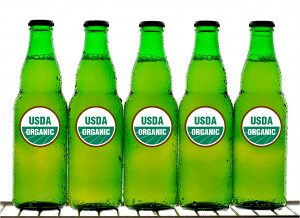
I just heard that the National Organic Standards Board (NOSB) earlier today voted unanimously “to require organic beer to include 100% organic hops beginning January 1, 2013.” If you haven’t been following this, under current USDA guidelines, a beer can be labeled “organic” if 95% of its ingredients are organic. Since less than 5% of beer consists of hops, that means almost any beer using organic malt may be called an organic beer. If a brewery uses 100% organic ingredients, they may label that beer “100% organic,” but all but the most savvy consumers are unaware of the difference. And it’s hard to argue that the current standard doesn’t cause confusion. I think most people who see a product labeled “organic” are going to assume that it’s all organic, not just mostly organic. There are actually four ways that beer can be labeled “organic” which includes the two I just mentioned plus “Made with Organic Ingredients” and “Some Organic Ingredients.” You can see the different standards at a post I did several Years ago, What Makes Beer Organic? The last two seem to convey the intended information, and so does saying “100%.” It’s that simple “organic” designation being only 95% that has people concerned — rightly so, I should add — and led the American Organic Hop Grower Association (AOHGA) to petition the USDA to “remove hops from the National List of non-organic ingredients allowed in organic food (section 205.606).” You can view the petition, and an addendum, at the AOGHA website.
Here’s some of the background, from an AOGHA press release:
Hops were first added to the National List by the NOSB in June 2007, when organic hops were primarily produced in Europe and New Zealand. Since then, the U.S. organic hop industry has made significant advances. Progressive, large-scale family farms in the Pacific Northwest and small, local growers across the country are now growing organic hops, even though the hop producers believe the market for them has remained weak due to the current NOSB policy which allows brewers to use less expensive, non-organic hops in their beer labeled organic.
In an attempt to remove hops from the National List, the American Organic Hop Grower Association (AOHGA) submitted a petition to the USDA in December 2009, supported by Sierra Nevada Brewing Company, Anheuser-Busch, Lakefront Brewery, Seven Bridges Cooperative, and Hopunion LLC.
When the USDA denied the petition, BT Loftus Ranches VP Patrick Smith wrote an impassioned essay, National Organic Standards Board to US Organic Hop Industry: “Drop Dead”, that nicely laid out the organic hop farmers’ case. In the middle of October, “thanks to his efforts, and the attendant “response from consumers, organic hop growers, and organic brewers, the NOSB Handling Committee has revised their previous recommendation and is now recommending that hops come off the National List on January 1, 2013.” Good news, to be sure, but it still required the full board of NOSB board vote on the petition again and accept the changed recommendation at a meeting in Madison today, as reported by Patrick Smith in an Organic Hops Update.

The AOHGA website is now updated with the following: “On October 28, 2010, the National Organic Standards Board unanimously voted in favor of the removal of hops from section 205.606 of the National List of Approved and Prohibited Substances, effective January 1, 2013.”

I think this is going to provide significant trouble for organic brewers producing flavorful hop-forward products. The brewers at Peak Organic told my local homebrew club that it’s fairly impossible to get organic hops in the quantities they need in the varietals that are typically showcased in American hops. He says that they can get “all the palisade we need” but have trouble sourcing the more citrusy, resiny, piny flavors that we typically associate with hop-forward American styles. Mind you it’s not that he doesn’t WANT to get these hops organic it’s that he CAN’T get them in the quantities and qualities they need. New Zealand hops are (for the most part) certified organic, but Riwaka and Nelson Sauvin aren’t the same as Amarillo, Chinook, Cascade, Centennial, and Columbus.
Surely a talented brewer can be creative with what’s available, but there’s going to be a noticable change in the flavor profile of organic, hop-forward beers for most producers (not everyone can afford to be Sierra Nevada and grow everything organically on their own estate). There’s going to be that “organic taste” of beers that feature strange hop varietals. Some may be good, some may be bad, but it’s certainly not going to be the same.
While I think this move may help the hop farmers, it’s not going to help the brewers. If the organic hop farmers want to really be helped they should start growing more of the varietals that people want. Instead I think it’s going to cause organic beer to transition towards a much more malty style.